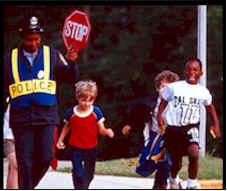|
|
|

February 19, 2002 -
Volume 8, Issue 3
|
|
| Bush
Highway Request Dominates Senate TEA-21
Hearing |
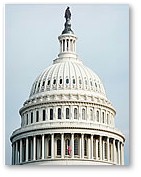 The Bush Administration’s FY’03 Budget and
its expected effects on national highway investment
dominated the Senate Environment and Public Works
Committee’s second hearing on TEA-21 renewal, held
February 11 by the Subcommittee on Transportation,
Infrastructure and Nuclear Safety. The Bush Administration’s FY’03 Budget and
its expected effects on national highway investment
dominated the Senate Environment and Public Works
Committee’s second hearing on TEA-21 renewal, held
February 11 by the Subcommittee on Transportation,
Infrastructure and Nuclear Safety.
Witnesses concentrated on the
revenue-adjusted spending level for the next fiscal year
of $23 billion, which is 16% below the baseline
established in TEA-21, and 27% below this year's
spending levels. Administration representatives
explained why and how spending was adjusted downward
while others discussed the potential dislocation to
state programs and job losses if the Bush request
stands.
In his opening statement,
Subcommittee Chair Harry Reid (D-NV) told Administration
representatives that “the President’s budget raises some
important short and long-term concerns.” Reid then said,
“I will get right to the point – the President’s budget
cannot be sustained. A 27 percent cut in highway funding
is a move in the wrong direction given our nation’s
transportation needs.”
Reid further explained that the
adjustment would result in a spending baseline that
“would spell disaster for our transportation system. In
fact, my focus is on doing just the opposite and finding
a way to increase funding for all of the components of
our surface transportation system – highways, transit,
and rail.”
Indicating their strong opposition
to the spending request, state highway and industry
officials used the hearing, as did several Committee
members, to call for further reforms related to
“environmental streamlining” when TEA-21 is
renewed.
Click
here to view statements by Senators and witnesses at
the hearing
|
| Committees Seek Highway Spending
Adjustment |
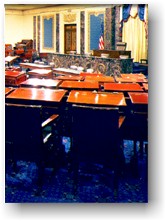 Congressional
transportation leaders in the House and Senate have been
rallying support for legislation (H.R. 3694/S. 1917) to
adjust the proposed spending level for highway programs
for the new fiscal year, which begins October 1. Congressional
transportation leaders in the House and Senate have been
rallying support for legislation (H.R. 3694/S. 1917) to
adjust the proposed spending level for highway programs
for the new fiscal year, which begins October 1.
As Congress adjourned for the
President's Day recess, a majority (227 Members) of the
House has already cosponsored H.R. 3694, only seven days
after the bill’s introduction. The Senate companion
bill, S. 1917, was also introduced February 7 and is
supported by every Member of the Senate Environment and
Public Works Committee, the panel that authorizes
federal highway spending under TEA-21.
While the pending legislation seeks
to restore highway spending (i.e. this year's obligation
limit) to TEA-21’s prescribed level of $27.6 billion, it
is still well below the current spending level of $31.8
billion. The spending adjustment is particularly
important in that FY’03 is the final year of TEA-21,
influencing assumptions about the budget baseline (or
starting point) that will guide overall spending in next
year’s legislation renewing TEA-21.
|
| Virginia Governor Orders Audit,
Cuts in State DOT |
 At a press conference on
February 12, Virginia Governor Mark Warner (D) ordered
an audit of the Virginia Department of Transportation
(VDOT) and announced road and transit spending decreases
of $368 million a year for the next five years. The
announcement came amid renewed allegations of
mismanagement and budgetary shortfalls at VDOT, in what
the governor has described as a transportation
crisis. “Now we are faced with assertions that
professional staff repeatedly raised warnings about
impending cash shortfalls,” said Governor Warner, "and
that these warnings were ignored by policy
makers.” At a press conference on
February 12, Virginia Governor Mark Warner (D) ordered
an audit of the Virginia Department of Transportation
(VDOT) and announced road and transit spending decreases
of $368 million a year for the next five years. The
announcement came amid renewed allegations of
mismanagement and budgetary shortfalls at VDOT, in what
the governor has described as a transportation
crisis. “Now we are faced with assertions that
professional staff repeatedly raised warnings about
impending cash shortfalls,” said Governor Warner, "and
that these warnings were ignored by policy
makers.”
For a Washington Post article on
Governor Warner's announcement, click
here
To read Governor Warner's press
release, click
here
|
| Rally
and Grassroots Hearing for Transportation
Equity |
|
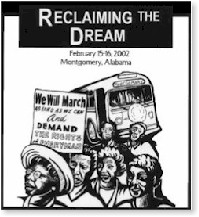 On February 15-16,
transportation and civil rights advocates held a summit,
rally and grassroots hearing in Montgomery, Alabama to
demonstrate the need to return equity to transportation
investments. The Montgomery Transportation Coalition
organized the events in partnership with the Surface
Transportation Policy Project and the Center for
Community Change. On February 15-16,
transportation and civil rights advocates held a summit,
rally and grassroots hearing in Montgomery, Alabama to
demonstrate the need to return equity to transportation
investments. The Montgomery Transportation Coalition
organized the events in partnership with the Surface
Transportation Policy Project and the Center for
Community Change.
Speakers at the hearing gave
testimony on their experiences with transit in
Montgomery, Atlanta, Baltimore, and Jackson, MS. A
common theme throughout the hearing was that transit
riders often face lengthy commutes, shabby equipment,
and lack of service on nights and weekends. Panelists
included staff from Rep. John Conyers' (D-MI) Washington
office, Alabama state legislator Thad McClammy,
Missisippi state legislator Eric Flemming, Graham
Sisson, Alabama State ADA Coordinator, and a district
representative for Rep. Earl Hilliard (D-AL).
Alabama’s federal transportation
funding soared by 60 percent after 1997, but the portion
of federal flexible funds going to transit, biking or
walking dropped from $1.7 million in 1996 to $0 in 1999.
The state used less than five percent of its total
federal transportation budget on transit in 1999. Of the
$1.25 billion in state funds spent on transportation in
2000, none supported transit.
The hearing took place immediately
following a march and rally on the Alabama capitol
steps. In revisiting the birthplace of the 1955 Bus
Boycott and the civil rights movement, this event
directed attention to the issue of transportation as a
means of economic freedom and social justice.
Montgomery's transit system served about 7,600 daily
riders at its peak in 1988, but fixed route service was
shut down in 1998 after deep budget cuts and a steep
decline in ridership. Local advocates are currently
struggling to re-establish service. "Transportation
planning should also involve social and economic impacts
of how we spend money," said Dr. Robert Bullard,
Director of the Environmental Justice Center at Clark
Atlanta University and keynote speaker at the
rally
Photos and transcripts will be
available soon at transact.org.
|
| Safe Routes to School
Congressional Hearing |
|
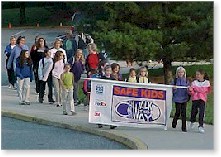 On February 5, health and
transportation officials and advocates from across the
country took part in a Congressional Forum to discuss
their efforts to create Safe Routes to School. Rep. Jim
Oberstar of Minnesota, ranking Democrat on the House
Transportation and Infrastructure Committee, convened
and moderated the forum in the Library of Congress. In
his opening statement, Rep. Oberstar lamented the health
of an "entire generation of children who are mobility
challenged." Dr. Jeff Runge, Administrator of the
National Highway Traffic Safety Administration (NHTSA),
emphasized the need to allow people of all ages to move
about safely and freely, to enable commerce and to
promote social interaction and health. He cautioned,
however, against encouraging children to walk or bicycle
without providing a safe street environment. Two top
officials of the Centers for Disease Control and
Prevention, Dr. Bill Dietz and Christine Branche, said
safe routes to school is important in fighting physical
inactivity and the obesity epidemic in children. On February 5, health and
transportation officials and advocates from across the
country took part in a Congressional Forum to discuss
their efforts to create Safe Routes to School. Rep. Jim
Oberstar of Minnesota, ranking Democrat on the House
Transportation and Infrastructure Committee, convened
and moderated the forum in the Library of Congress. In
his opening statement, Rep. Oberstar lamented the health
of an "entire generation of children who are mobility
challenged." Dr. Jeff Runge, Administrator of the
National Highway Traffic Safety Administration (NHTSA),
emphasized the need to allow people of all ages to move
about safely and freely, to enable commerce and to
promote social interaction and health. He cautioned,
however, against encouraging children to walk or bicycle
without providing a safe street environment. Two top
officials of the Centers for Disease Control and
Prevention, Dr. Bill Dietz and Christine Branche, said
safe routes to school is important in fighting physical
inactivity and the obesity epidemic in children.
A major issue for Safe Routes to
Schools programs is the funding of engineering changes -
sidewalks, crosswalks, traffic signals - typically the
most costly of the "four E’s" of pedestrian and
bicyclist safety. STPP’s Barbara McCann and James
Corless discussed state-level efforts to use federal
safety money for Safe Routes to School engineering
projects. While programs in California and Washington
have experienced demand far in excess of funding,
proposals for similar programs in other states have been
opposed by state Departments of Transportation and
typically killed in committee.
STPP took the opportunity at the
forum to release an updated Summary of Safe Routes to
School Programs. The document is now available on STPP’s
website.
| |
|
| |
In
Brief... |
| |
The Surface Transportation
Policy Project has launched a new website, tea3.org. The site will
keep you posted on the hearing schedule, policy issues,
and other developments in the TEA-21 reauthorization
process. The current news item is an analysis of the
Bush budget.
For more info, visit: http://www.tea3.org/.
|
| |
Calendar |
| |
League
of American Bicyclists Bike Summit
Washington,
DC
March 6-8,
2002
National Conference on Aging &
Mobility
March 25-27, 2002
Transportation and University
Communities Conference
Amherst, MA
June 15-18, 2002
Senate EPW Transportation
Schedule
Feb. 19: 03
budget & the Highway Trust
Fund
Late Mar.
"Mobility, Congestion,
and
Intermodalism"
House
Transportation Committee
Schedule
Mar.
6: Subcommittee
hearing on Amtrak
status
Apr.
11: Subcommittee
hearing on passenger rail
Millennial Housing Commission
Report:
Due to the US Senate on
or by March 1
|
| |
Quote
of the Week |
| |
"There's never been
an urban center in America with the magnitude of
Northern Virginia that has ever road-built their way out
of a traffic jam. God knows Los Angeles tried."
- VA Sen. Richard L. Saslaw (D-Springfield) on
whether it was time the state changes its way of
developing and building roads.
| |
|
Transfer is
written
and
edited by
John
Goldener of the Surface Transportation Policy
Project.
Readers are invited to reprint newsletter items; proper citation is
appreciated. If you are not currently subscribed, please send us a
note via e-mail to: mailto:%20transfer@transact.org.
Be sure to include your full mailing address and name of your
organization, phone and fax numbers. For comments and suggestions
about Transfer's content, contact John Goldener at jgoldener@transact.org.
We
rely on donations to provide Transfer and other services. Please
consider making a donation to STPP via
the secure "Support STPP"
link on our homepage. For more information about
STPP
visit
our web site at http://www.transact.org/
or call 202.466.2636.
|
|
